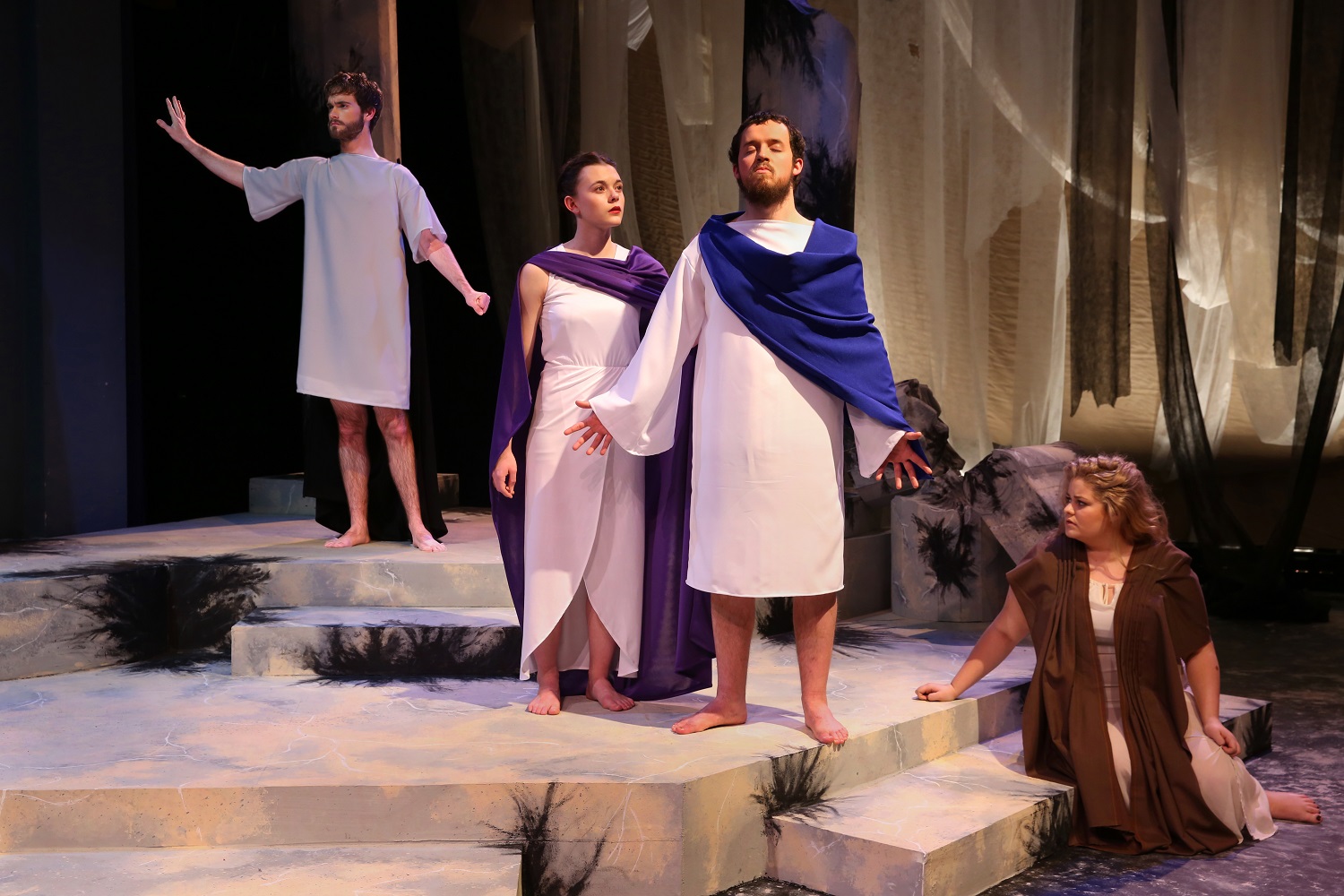Tickets Now on Sale for OBU Theatre’s ‘Oedipus the King’ March 4-6
February 17, 2016
OBU Theatre will present Sophocles’ play “Oedipus the King,” opening Friday, March 4, at 7:30 p.m. in OBU’s Craig-Dorland Theatre in Shawnee Hall. Additional performances will take place Saturday, March 5, at 2:30 and 7:30 p.m., and Sunday, March 6, at 2:30 p.m.
Tickets are $11 for adults and $5 for students. Tickets may be purchased online now at www.okbu.edu/theatre or in the main office of OBU’s Sarkeys Telecommunication Center, open Monday-Friday, 9 a.m.-4:30 p.m., beginning Feb. 19. The play will be most enjoyed by those 15 years of age and older.
In the dramatic world of Sophocles' “Oedipus the King,” everything happens on a grand scale, from feats of heroism to the greatest of mistakes. When Oedipus learns that an unsolved murder has caused the plague ravaging his city, he pledges to exile the killer - only to find that old prophecies hold a devastating truth.
“Oedipus the King” unfolds as a murder mystery, a political thriller and a psychological whodunit. Throughout this mythic story of patricide and incest, Sophocles emphasizes the irony of a man determined to track down, expose and punish an assassin, who turns out to be himself.
“Greek plays are amazing,” says Jennifer Ezell, director of the production. “I love delving into the poetic, powerful, and inspiring language. When I think about Oedipus, I am reminded that across time, cultures and religions, people are always searching for the same things. We want to know if we have a purpose, why bad things happen to good people, if we can control anything. We hope that our prayers rise to a higher power that can hear us, help us and heal us. For me, there is something quite beautiful in knowing that all humanity seems to be connected in this way.”
The wide variety of cast members include junior Conner Gilbert, a theatre major from Shawnee, as Oedipus, and junior Kymber Sage, a theatre major from Broken Arrow, Oklahoma, as Jocasta. Tony Quintana, a senior double-major in theatre and youth ministry from Oklahoma City, plays Kreon and the Messenger, while Trevor Rodman, an OBU alumnus from Tulsa, Oklahoma, plays Tiresias. Elizabeth Grimes, a sophomore theatre major from Midwest City, Oklahoma, plays the Priestess of Zeus and a chorus member. Olivia Seamans, a senior theatre major from Moore, Oklahoma, plays the leader of the chorus.
Members of the chorus include Matthew Martin, a junior sociology major from Irving, Texas; Caleb Shantz, a sophomore theatre major from Yukon, Oklahoma; Haylee Dowler, an OBU alumna from Bixby, Oklahoma; Rachel Lowe, a junior secondary English education major from Lawton, Oklahoma; Andrew Wright, a senior creative writing major from Chiayi, Taiwan; Stephen Whitmore, a senior biochemistry major from Shawnee; Caitlin Cullison, a junior interdisciplinary major from Lempsten, New Hampshire; Ashley Elliot, a freshman vocal performance major from Tecumseh, Oklahoma; Joel Cannon, a freshman vocal performance major from Lawton; and Ashley Hontz, a freshman secondary English education major from Osage Beach, Missouri. Martin will also play the part of a shepherd and Shantz the part of a servant.
“With my scenic design, I wanted to highlight the contrast between the paragons and pitfalls of the play and also show the antithesis of the gods and man,” says Grace Wohlschlegel, stage manager and set designer. “I created an unbalanced kind of symmetry that exhibits man’s ill-conceived attempt to rise above the gods. Attempting to embody the idea of overwhelming suffocation and suffering, I brought the set forward and tried to capture the idea of a smoldering city.”
“It is incredible to me how much more powerful a script is on stage as opposed to reading it in a classroom,” says Samantha King, dramaturg and sound designer. “The amount of power it holds when performed is remarkable and increases the relatability one can have to these characters living in a time so vastly different than our own. In short, this piece is universal because these struggling people are facing emotions, fears, and mistakes that people of today are faced with, too.”
